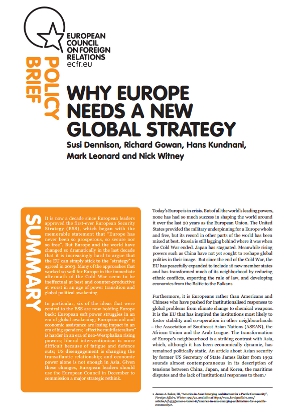European defence: ten years on
A transformed world poses fundamental military and political questions that Europe's national leaders need to answer. Perhaps the most useful thing this week's summit could do is open the door to a thorough debate on the future of Europe's foreign policy.
Ten years ago to the month, a European Council meeting in Brussels blessed the first European Security Strategy (ESS). It was a document rightly praised both for its lucidity, and for its prescription of a more active, more capable and more coherent EU, facing the wider world with confidence. National leaders gathering today for their summit discussion on defence and security could do worse than glance again at that document – if only to remind themselves how utterly the world has changed over the intervening decade, and how far short of its early ambitions their Common Defence and Security Policy (CSDP) has fallen.
For the ESS evoked a world which the West (the US, with Europe as junior partner) effectively ran. Democracy and free-market capitalism had triumphed; the West was morally as much as militarily unassailable. Liberal interventionism (for all the drama over Iraq) was soon to be endorsed by the UN as the ‘responsibility to protect’. And the EU could congratulate itself on its unique model of co-prosperity, and the power of attraction it thus exercised over its neighbours.
That world has gone forever. America’s unipolar moment is history, and multipolarity the new reality. The Chinese economy has doubled in size in the decade, and is heading to overtake the US itself by 2030. And the rising powers have declined their assigned role of ‘responsible stakeholders’ in the Western-designed international order, preferring to use such fora as the UN and WTO as much to obstruct as to cooperate. Meanwhile, Europe’s ‘soft power’ has wilted in the face of its economic and financial woes. Nowhere has this been more apparent than in its own neighbourhood, where it has been able neither to sustain the Arab Spring nor to ensure the European trajectory of Eastern European states subject to Russian coercion.
America’s response to these transformative changes has been its ‘pivot to Asia’ – with its concomitant message to Europeans that they need to be prepared in future to do more fending for themselves. Which was of course exactly the original purpose of the CSDP, born of the exposure by the Balkan wars of European military weakness. Yet Libya pointed up how little has been done to repair the deficiencies; whilst the EU’s failure to deploy one of its unused battlegroups to Mali, and now to the Central African Republic, seems tacit confirmation of ambitions now de-scoped to training and advisory roles. The hollowing-out of CSDP as a military enterprise is evidenced by the dearth of military proposals for the summit: the usual lauding of the ‘comprehensive approach’ will not disguise that even such obvious cost-cutting ideas as sharing the air-policing of European airspace can no longer get a hearing.
Nor are the capability or industrial domains in better shape. ‘Pooling and sharing’ is the new orthodoxy – yet in practice everyone prefers, for all the inefficiency and waste, to plan and equip their armed forces on a national basis. The European Defence Agency continues to surface ideas for new cooperations, which ministers routinely welcome: but actual levels of cooperation are falling. The Commission similarly finds no disagreement when it stresses the importance of sustaining defence research, and of integrating Europe’s defence industrial base: but governments have halved their research investment over a decade, and when the historic chance offers to merge BAESystems and EADS, they turn it down.
So is it ‘game over’ for European defence? Not necessarily. What has become self-evident is that national leaders must again take control of the issue themselves – and the presence of the subject on the current summit’s agenda is a welcome sign. But benediction alone – a communique full of ‘endorses’ and ‘welcomes’ – will not be enough. The European Council must exercise at least a modicum of collective grip: set some deadlines, require some reporting back. Drones – a capability area not just of critical military importance but also key to the future of civil aerospace in Europe – would be a good place to start. The boss of EADS has called for ‘concrete initiatives’, but fears ‘just another declaration of nice words’. Let the national leaders prove him wrong. And let them also make a clear commitment to showing each other their national defence investment plans – the only way in which opportunities for pooling and sharing can be identified.
But, most important of all, the summiteers need to take stock. Assertions that ‘defence matters’ will cut no ice with publics disillusioned by Iraq and Afghanistan, and feeling no external threat, unless national leaders can explain why, and with conviction. But conviction is hard to muster when fundamental questions are unanswered: about the nature of the new international environment, and where it is headed; about the role that Europeans should seek to play in it; and about how far armed forces remain relevant as policy instruments. Perhaps the most useful thing this summit could do is open the door to that debate.
The European Council on Foreign Relations does not take collective positions. ECFR publications only represent the views of their individual authors.



